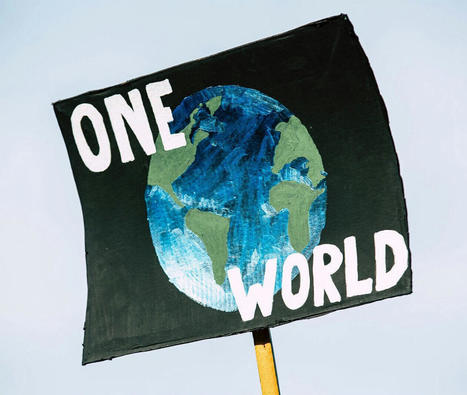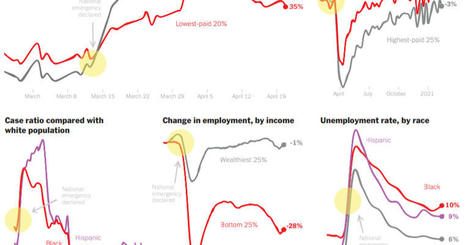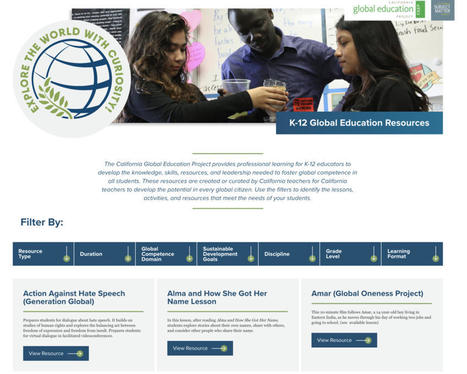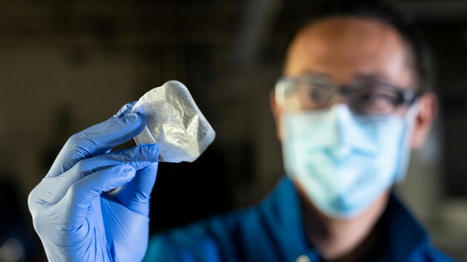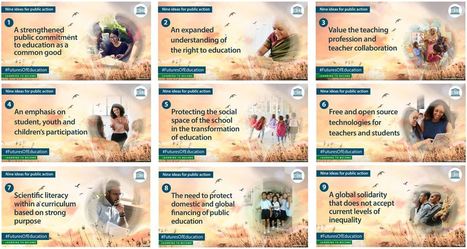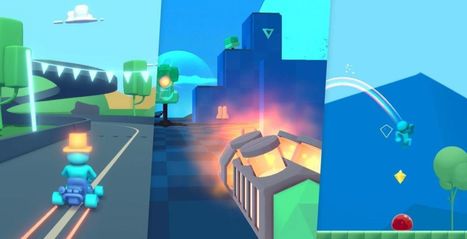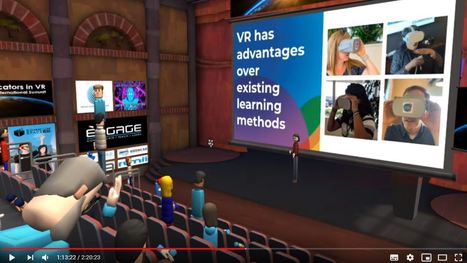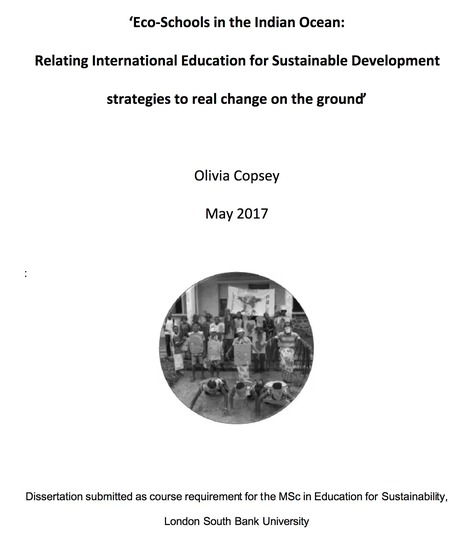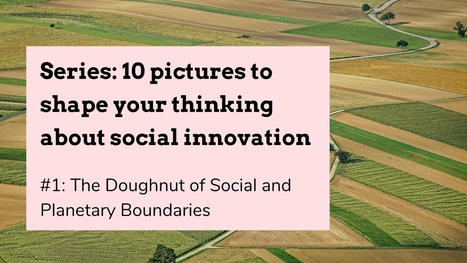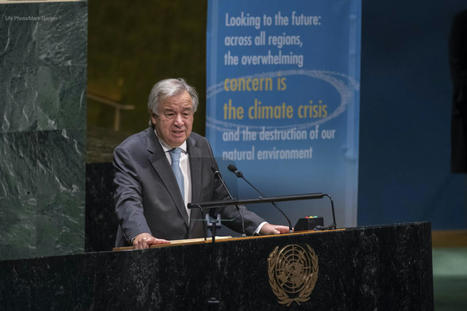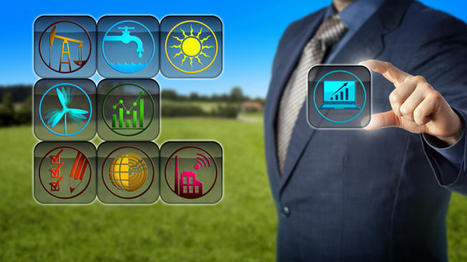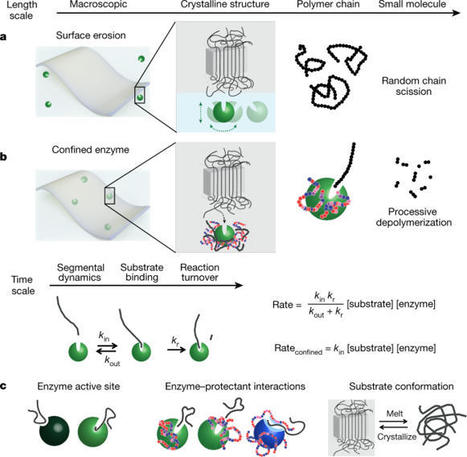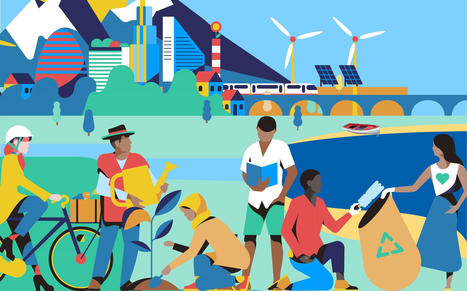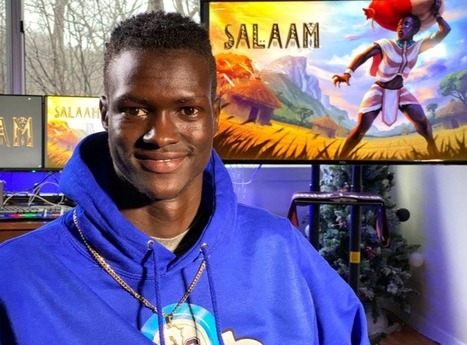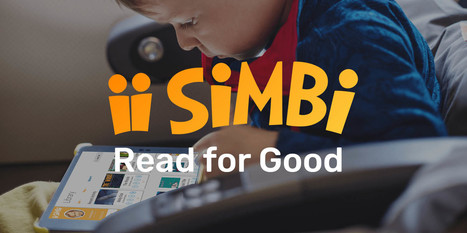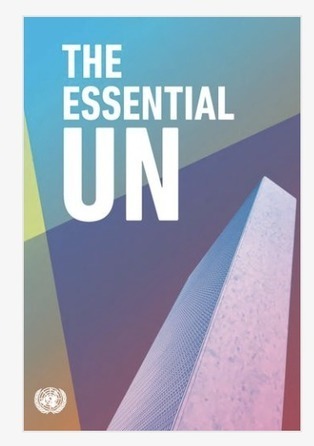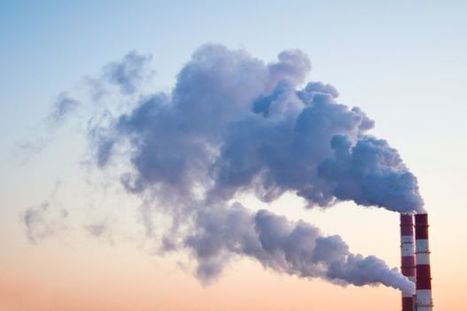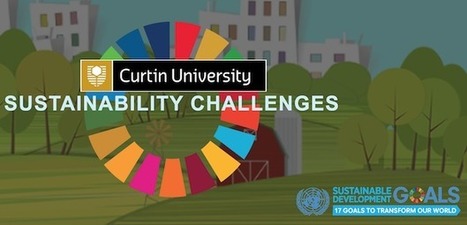 Your new post is loading...

|
Scooped by
Kim Flintoff
November 16, 2017 9:38 PM
|
We have an obligation to alert and empower young people to address these challenges and create new ways of engaging with the world and its people.

|
Scooped by
Kim Flintoff
October 26, 2021 9:22 PM
|
Join a personal and professional global learning journey towards a sustainable future. What on Earth could be more important? From the University of Edinburgh.

|
Scooped by
Kim Flintoff
October 25, 2021 8:57 PM
|
A collection of resources from Climate Reality relating to priorities at the 2021 COP26 in Glasgow.

|
Rescooped by
Kim Flintoff
from :: The 4th Era ::
May 14, 2021 7:24 PM
|
In this lesson, students will explore social inequalities in income, education and health care, many exacerbated by issues of race and gender, using New York Times graphs.
Via Jim Lerman

|
Scooped by
Kim Flintoff
May 5, 2021 5:49 PM
|
California Global Education Project

|
Scooped by
Kim Flintoff
April 23, 2021 11:31 PM
|
Biodegradable plastic bags, cutlery, and coffee cup lids may seem like a win for the environment, but they often introduce more problems than solutions. But now a research team from the US may be able to change that.

|
Scooped by
Caroline Marsh
August 25, 2020 7:17 AM
|
We have an obligation to alert and empower young people to address these challenges and create new ways of engaging with the world and its people.
Via Kim Flintoff, Rees Duncan Barrett
We have an obligation to alert and empower young people to address these challenges and create new ways of engaging with the world and its people.
Via Kim Flintoff
Unity, arguably the biggest game engine in the world, is giving away hundreds of hours of premium game developing tutorials for free because of the coronavirus. For three months until June 20th, aspiring game makers will be able to get their hands on courses on everything from coding to design, and get access to Unity's daily interactive live lessons, Create with Code.
Via Peter Mellow
2020 Educators in VR International Summit February 17-22, 2020 The 2020 Educators in VR International Summit is a free, open-to-the public, virtual event lasting 6 days (over 150 round-the-clock hours) with a diverse range of over 150 speakers and presentations covering: Down to The Basics of VR/AR/XR/MR Research into Spatial Technologies in Education Corporate Uses…
Via Peter Mellow

|
Scooped by
Kim Flintoff
April 2, 2020 3:07 AM
|
The urgent action needed to prepare communities for climate change impacts on Small Island Developing States (SIDS) is well documented within international policy. Several high-level strategies devote special priority to Education for Sustainable

|
Scooped by
Kim Flintoff
March 29, 2020 9:04 PM
|
This paper presents the results of a systematic review of literature (56 studies) related to Sustainable Development Goal 4.7. The goal of the research reported on here is to contribute to the discussion around strategies for working towards and
|

|
Scooped by
Kim Flintoff
July 22, 2023 11:46 PM
|
Coming into the world of design and innovation, the Design Council’s double diamond diagram really helped me to make sense of what everyone was talking about. In a simple picture, it linked a conceptual approach to problem-solving (with a focus on empathy, rapid ideation and iterative prototyping) to a really practical process that I could … Continue reading "The Doughnut of Social and Planetary Boundaries"

|
Scooped by
Kim Flintoff
October 26, 2021 8:56 PM
|
The One UN Climate Change Learning Partnership, also known as UN CC:Learn, is a collaborative initiative of 36 multilateral organizations working together to help countries build the knowledge and skills they need to take action on climate change. These include better climate literacy and other crucial skills to tackle this challenge. UN CC:Learn provides guidance and quality learning resources to support people, governments and businesses to understand, adapt, and build resilience to climate change. The Secretariat for UN CC:Learn is provided by the United Nations Institute for Training and Research (UNITAR). UN CC:Learn is supported by the Swiss Agency for Development and Cooperation (SDC) and UN Partners.

|
Scooped by
Kim Flintoff
September 23, 2021 11:35 PM
|
All materials in this board are open and free to be used properly for communications purposes and with reference/mention/tag to @SDGAction @DigitalPromise @Oculus. If you have any questions regarding the materials here please email support@sdgactioncampaign.org or myworld360@digitalpromise.org

|
Rescooped by
Kim Flintoff
from Sustainable Procurement News
May 14, 2021 7:23 PM
|
Yet another impact of the COVID-19 pandemic has been revealed. Consumers now have an elevated ' focus on sustainability and willingness to pay out of their own pockets – or even take a pay cut – for a sustainable future, according to a new IBM Institute for Business Value (IBV) survey of over 14,000 consumers in nine countries.
Via EcoVadis

|
Scooped by
Kim Flintoff
April 23, 2021 11:33 PM
|
Successfully interfacing enzymes and biomachinery with polymers affords on-demand modification and/or programmable degradation during the manufacture, utilization and disposal of plastics, but requires controlled biocatalysis in solid matrices with macromolecular substrates1–7. Embedding enzyme microparticles speeds up polyester degradation, but compromises host properties and unintentionally accelerates the formation of microplastics with partial polymer degradation6,8,9. Here we show that by nanoscopically dispersing enzymes with deep active sites, semi-crystalline polyesters can be degraded primarily via chain-end-mediated processive depolymerization with programmable latency and material integrity, akin to polyadenylation-induced messenger RNA decay10. It is also feasible to achieve processivity with enzymes that have surface-exposed active sites by engineering enzyme–protectant–polymer complexes. Poly(caprolactone) and poly(lactic acid) containing less than 2 weight per cent enzymes are depolymerized in days, with up to 98 per cent polymer-to-small-molecule conversion in standard soil composts and household tap water, completely eliminating current needs to separate and landfill their products in compost facilities. Furthermore, oxidases embedded in polyolefins retain their activities. However, hydrocarbon polymers do not closely associate with enzymes, as their polyester counterparts do, and the reactive radicals that are generated cannot chemically modify the macromolecular host. This study provides molecular guidance towards enzyme–polymer pairing and the selection of enzyme protectants to modulate substrate selectivity and optimize biocatalytic pathways. The results also highlight the need for in-depth research in solid-state enzymology, especially in multi-step enzymatic cascades, to tackle chemically dormant substrates without creating secondary environmental contamination and/or biosafety concerns. Nanoscopic dispersion of enzymes with deep active sites enables chain-end-mediated processive biodegradation of semi-crystalline polyesters with programmable latency and material integrity.

|
Scooped by
Kim Flintoff
February 21, 2021 9:15 AM
|
Read UNEP's first fully interactive e-publication, GEO-6 for Youth, written by youth for youth to inform, engage, educate, and lead youth towards environmental action.
This paper presents the results of a systematic review of literature (56 studies) related to Sustainable Development Goal 4.7. The goal of the research reported on here is to contribute to the discussion around strategies for working towards and
Via Kim Flintoff
Lual Mayen, a refugee who fled South Sudan's civil war and learned to code in a refugee camp, has created a video game of his struggle. He hopes it will raise awareness among young people - and save lives.

|
Scooped by
Samantha-Kaye Johnston
April 6, 2020 8:27 AM
|
Simbi gets people to love to read through an innovative reading-while-listening and reading-out-loud platform for readers and educators.

|
Scooped by
Samantha-Kaye Johnston
April 3, 2020 11:57 PM
|
Access curated list of Global Goals videos and watch for updated resources as shared by the UN Global Goals community.
"Our brain’s inability to deal with issues we deem too far into the future is one of the reasons why scientists say people are not addressing climate change faster — some don’t even think it’s real. Turns out, talking about a nondescript threat does not trigger the inherent flight or fight response necessary to take action. Rather, many environmentalists believe showing the scenarios is most effective.
That’s what Xennial Digital is doing for K-12 education through a spatial computing experience on Magic Leap. The extended reality (XR) company was selected for Magic Leap’s Independent Creator Program (ICP), which supports cutting edge development. Xennial began working in the education space a few years ago when the U.S. Department of Education opened a challenge to propose transformative educational solutions.
Their climate change application available on Magic Leap World presents different scientific predictions — from optimistic to nightmare — across five key data points: ice fraction, precipitation, air temperature, ocean temperature and sea level rise."

|
Scooped by
Kim Flintoff
April 1, 2020 8:58 PM
|
Several dozen of the world’s top universities have teamed up to press for action on climate change, saying the coronavirus pandemic should not erase attention on the dangers of a warming world.
The International Universities Climate Alliance (IUCA), unveiled on 2 April, showcases climate change research from 40 universities in 18 countries across six continents.
The group includes institutions with global strengths in key disciplines for both analysing and resolving climate change, such as engineering, economics, law, social science and planning as well as climate science.

|
Rescooped by
Kim Flintoff
from Teaching during COVID-19
March 27, 2020 1:43 AM
|
You can enrol as many students from your school as you wish. All students will need to pair up with a classmate or someone they know at school or in their community, so they can work side-by-side. Each pair will then meet and join up with a pair of students from anywhere else in the world. Ideally all teams should have 4 students. Teams can have as many advisors and helpers as they wish, but only four students will be the officially recognised team.
|

 Your new post is loading...
Your new post is loading...










